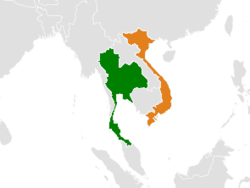Thailand–Vietnam relations
This article needs additional citations for verification. (March 2017) |
 | |
Thailand |
Vietnam |
|---|---|
| Diplomatic mission | |
| Embassy of Thailand, Hanoi | Embassy of Vietnam, Bangkok |
| Envoy | |
| Ambassador Nikorndej Balankura | Ambassador Phan Chí Thành |
Thailand and Vietnam share current and historical rivalry but maintain peaceful bilateral relations. Thailand has an embassy in Hanoi and Vietnam has an embassy in Bangkok.[1] Both countries are members of ASEAN.
History[]

Both two countries were at least under influence of India during historical past, as Siam and southern Vietnam, Champa, were heavily Indianized by culture. However, the first real contact between Siam and Vietnam was recorded in the 16th century.
Siamese-Vietnamese wars[]
At least in historical records[specify], Thailand (as Siam) and the Vietnamese state fought together in a massive series of wars that began in the early 18th century. However, larger conflicts were recorded from the later 18th century.
Tây Sơn unrest[]
After the overthrow of the Nguyễn Lord, Nguyễn Ánh, the last few survivors, sought vengeance by requesting assistance from Siam, whose force conducted a massive invasion into the newly-annexed southern Vietnam and committed atrocities there. A massive blow later has Siam being beaten disastrously by the Tay Son force, led by Nguyễn Huệ.
19th century[]
The Siamese and Vietnamese encountered two massive wars at the region, which led much to the destruction of Cambodia. Vietnam defeated Siam one, and another war ended in a stalemate. Thus, rivalry between two powers in the region remained until the French invasion of Cochinchina, which prevented a further conflict.
Vietnam War and Khmer Rouge[]
Thailand participated in the Vietnam War[2] on the side of the United States over fears of the domino theory and the communist insurgency in Thailand. Of the 12,000–15,000 Thai troops to fight in the war, over 2,000 casualties were recorded. After 1975, Thai–Vietnamese relations remained sour and very tense.
After the Vietnamese invasion of Cambodia resulted in the overthrow of the Khmer Rouge, Vietnam was in deep conflict with Thailand because of Thai support for the overthrown regime. Border raids were launched between both nations, damaged much of Cambodia, and further soured relations.
Hostility between Thailand and Vietnam ended in 1989, when Vietnamese forces retreated from Cambodia.
Modern relations[]
After Nguyễn Văn Linh's 1986 Đổi mới reforms, Vietnam moved from socialism to more integration with the international community. As a result, Thai–Vietnamese relations have quickly improved. Thailand, a founding member of ASEAN, supported Vietnam in joining the ASEAN, which occurred in 1995. Thus, the once-poor relationship between Thailand and Vietnam has turned into one of strategic co-operation and alliance.[3]
Economic relations[]
In 2015, Thailand was the tenth-largest investor in Vietnam, worth nearly US$7 billion. Thailand was also Vietnam's fifth-largest trading partner.[4]
Football rivalry[]
The rise of Vietnam and subsequent rampant Vietnamese nationalism has led to the increase of rivalry between Vietnam and Thailand, which has established the heated football rivalry football.[5]
References[]
- ^ Thai-Vietnamese relations. http://www.nationmultimedia.com/news/opinion/kavi/30264322
- ^ Thai soldiers in Vietnam War. http://www.uhpress.hawaii.edu/p-9780824834890.aspx
- ^ Vietnam, Thailand's relations thrives. http://vietnamnews.vn/politics-laws/273500/vn-thailands-relationship-thrives.html
- ^ "VN, Thailand's relationship thrives".
- ^ "World Cup qualifiers: Thailand under greater pressure, says Vietnam coach - VnExpress International".
External links[]
- Thailand–Vietnam relations
- Bilateral relations of Thailand
- Bilateral relations of Vietnam

